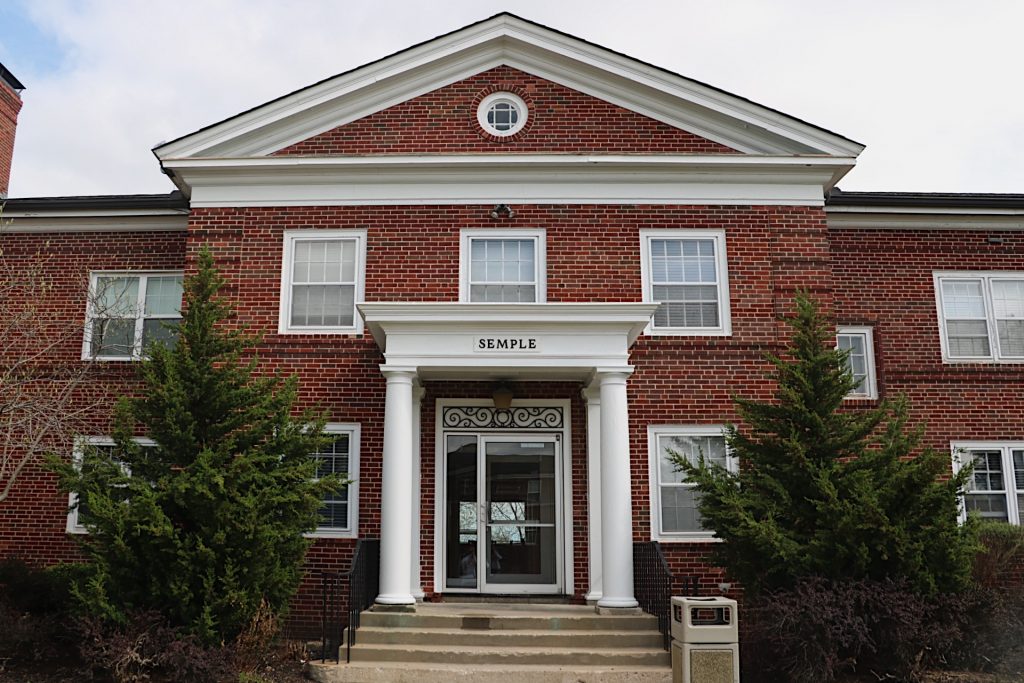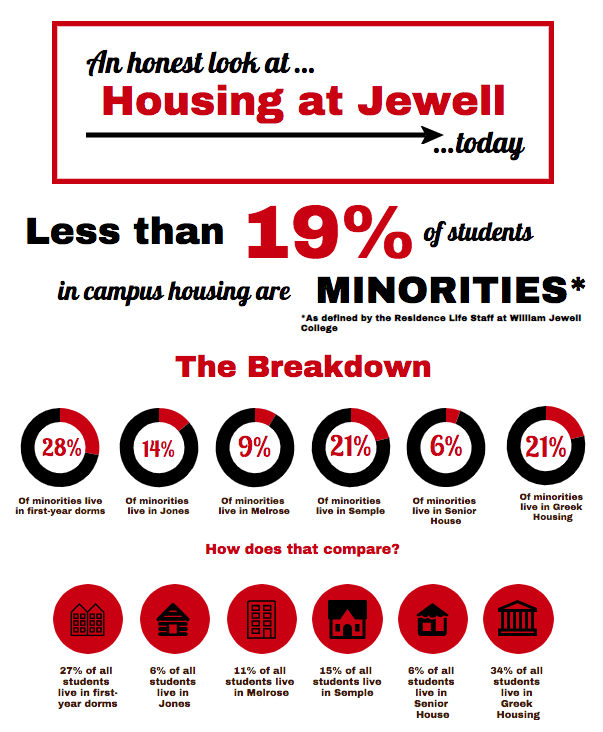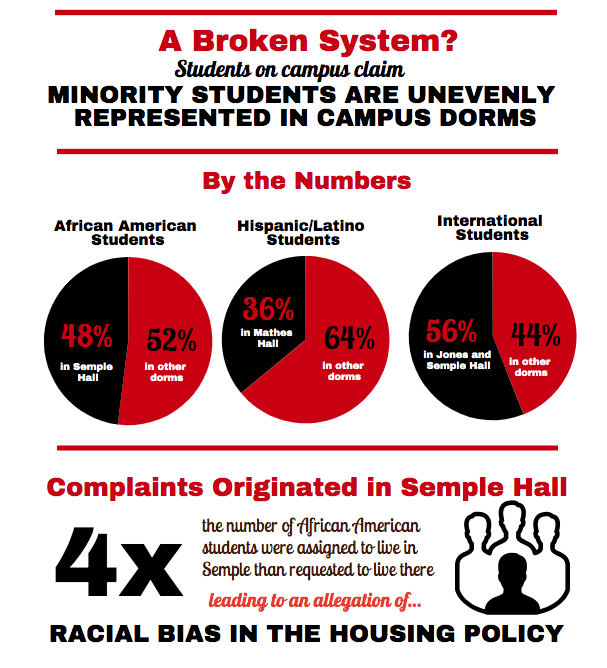
Complaints about racial bias in the housing assignment procedure at William Jewell College surfaced during the March 27 Diversity and Inclusion (D&I) event, but Ernie Stufflebean, assistant dean of Student Life and director of Residence Life, calls those concerns surprising and completely unfounded.
Allegations that a majority of, self-identified, African American or black students are assigned to live in the same dorm – Semple Hall – came to light during the Diversity and Inclusion event in which college leaders asked students if they’d seen examples of discrimination and racism on campus.
At the D&I event the accusations of racial bias in housing assignments were made by Micah Williams, junior Biology and Applied Critical Thought and Inquiry (ACT-In) major and president of the Black Students Association (BSA). The Hilltop Monitor sat down with Williams to learn more about these claims.
“It’s weird to me they [African American or black students] all live close together,” said Williams.“Is it a coincidence or not? It’s hard not to look like a race thing.”
“The good majority of people who live there don’t want to be there,” Williams added.
But Stufflebean calls the accusations false and asserted race is never a factor when housing decisions are made.
“It’s absolutely not true,” Stufflebean said, adding he was shocked when he heard the claims during the diversity event. “But there is that perception out there now and that is a problem.”
Housing records for the 2018-2019 academic year that Stufflebean provided The Hilltop Monitor, however, appear to support the students’ accusation.
Jewell defines “minority students” as
Using this definition, the data shows that minority students are not represented equally in the campus’ residential facilities.

Based on those figures, 48% – or almost half of the black or African American students who live on campus – live in Semple Hall. Considering African American students

Records show that only three of the black students living in Semple selected this dorm as their first choice when completing their 2018-2019 housing application. The other nine who were assigned would have preferred to live in a different facility.
Semple is generally ranked lower on preference lists due to one key reason: its allegedly run down conditions.
“It’s the worst building on campus,” said Williams, who lived in Semple Hall last year. “The water doesn’t work half the time, and there’s mold.”
Stufflebean said Semple Hall, built in 1957, underwent “pretty significant renovations within the last six or seven years.” Updates included new ceiling, paint and LED lighting.
“We’re not worried about paint, we’re worried about the water in bathrooms and small room sizes,” says Williams. “If we’re forced to live here all four years, at least give us somewhere nice to live.”
Days after the D&I event Residence Life Staff announced that Semple Hall would be closed for the 2019-2020 academic year to undergo renovations. It was said that this decision was made after conversations with the Student Senate. Hannah Keeney, junior psychological science major and (at the time) Treasurer of the Student Senate, said that these conversations were not related to the D&I event.
“To my knowledge, the closing of Semple is completely isolated from any D&I roundtable topics brought up,” said Keeney. “I believe the closure of Semple is completely related to building repairs and renovation.”
The statistical aversion students have to
Stufflebean said his office uses a Microsoft Excel program in the housing selection process and again emphasized race is never a factor. Student housing, he said, follows the school’s non-discrimination policy.
Stufflebean noted that the housing applications are linked to a student database which includes factors like athletic commitments, majors and whether or not the student is in Greek Life, but does not include any information about race.
Students are also allowed to self-identify their gender on the housing forms and this can play a role in the assignment of dorms, largely due to the limited number rooms available for each gender in each dorm, and the locations of gender neutral housing.
In the lottery for housing priority is first given to seniors, then juniors and sophomores. All first-years live in either Mathes Hall or Eaton Hall.
Within each grade level, priority is also determined by the date and time students turn in their housing application. The sooner students turn in their housing applications, the more likely they are to get their first pick.
Once one dorm fills up, students are automatically put into their second choice residence hall. That means Semple Hall, often picked last on a student’s ranking, serves as overflow housing. Semple Hall also houses many transfer students, these students – who frequently do not visit the campus prior to enrolling – do not get the opportunity to rank housing preferences and are automatically assigned to live in Semple in the interest of them being allocated housing efficiently.
Stufflebean said students who do not get to live in the dorm they requested are automatically waitlisted for their first choice. That means if an opening becomes available, the next student on the priority list will be contacted. Students can also ask Stufflebean for their order on that list.
Stufflebean said students can also talk to Student Life about their housing assignment at any time, although few take advantage of this option.
“You can request a room change even before the school year,” Stufflebean said. “We do everything we can to make sure students are in a place where they are comfortable.”
But students must have their bills paid to get priority housing selections.
“If a student has an outstanding balance, they may not be able to register for classes next year, which bounces them from the housing process,” Stufflebean says.
After hearing students’ concerns about possible housing discrimination, Stufflebean said he’s open to new ideas to ensure the selection process is fair.
“I’m not wed to this priority system. If the students think there’s a better way, like maybe including GPA [in determining priority], then we’re willing to talk about it. Let’s have a discussion,” Stufflebean said.
Williams, who works in Student Life and understands the inner-workings of the system, said the administration must do a better job educating students on the housing process.
“If it’s by timing you need to let people know – educate us. We deserve that,” Williams said.
Williams also said students aren’t aware of the connection between outstanding balances and their housing selections.
“If you saw how many people weren’t registered you’d be surprised. I know they make sure you know you have a balance, but the housing issue is sort of fine print,” said Williams.
Williams has one final message for the administration.
“I want them to acknowledge there is a problem – this administration tries to sweep things under the rug like we’ll forget about it. Find a way to educate us so it does not happen again.”
Both Keeney and Williams were elected to serve on the 2019-2020 Student Senate Cabinet, April 18. D&I will be a priority during their leadership and they plan to work with Student Life to implement a more equitable housing policy at Jewell.
“We look forward to investigating this issue further and working towards a more inclusive community, within upperclassmen housing in particular,” said Keeney. “We plan to meet with Student Life at least once before the school year ends, and this will be one of the topics our cabinet would like to discuss in addition to continuing
